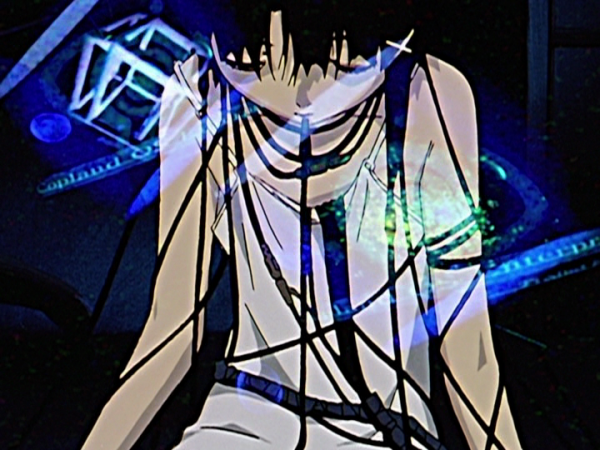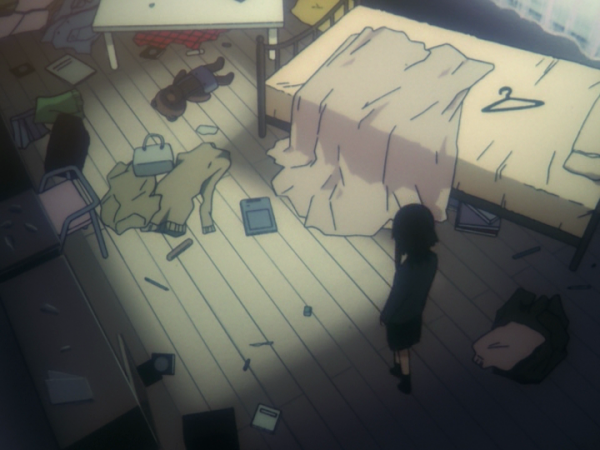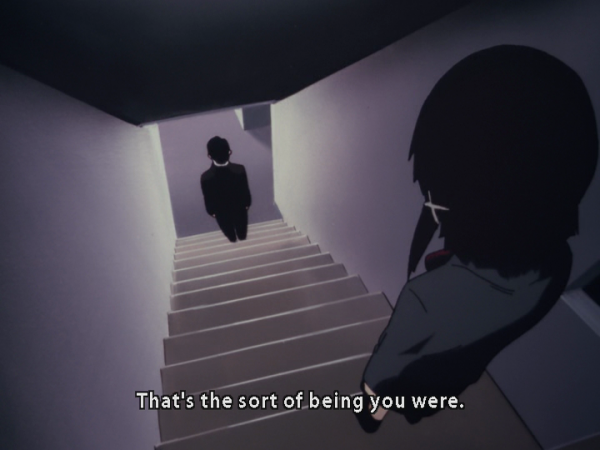Love
Back to serial experiments lain. Layer 10: Love starts with our cityscape, but no voice-over this time. Lain and Eiri have a conversation in which they speak in each other’s voices, and Eiri explains how he put his consciousness into Protocol 7. Given his power he’s arguably a god, but to truly be a god he also needs worshippers, so he made himself a cult - the Knights. At school, Lain’s desk is gone and everyone is oblivious to her presence. As she starts to wonder if maybe she doesn’t need a body after all, Alice, or rather someone speaking through Alice, confirms this. Lain goes home, but the house is eerily empty and unkempt. Her room is messy, but none of her computer equipment is there. Mr. Iwakura appears in the doorway, says his work is done because Lain must have figured things out by now, that he loved her, assures her she’s not alone because of the type of being she is and everyone she can connect to in the Wired, and leaves.
Lain searches for information on the Knights, doxes them, and the MIBs go out and kill them. They then go to Lain’s house where she’s entangled in cables. One of them, Karl, explains that they’d assassinated the Knights as a job for a client, that the Wired can’t be a world to itself, and that they aren’t sure what sort of being Lain is. He adds as they leave that he loves her.
Back out in the street, Eiri tells Lain that she’s essentially a homunculus, that he’s “the man who loves her,” and that she should love him. Lain angrily refuses and he disappears.

The first question to answer here is why there’s no voice-over. These weren’t warm or welcoming, exactly, but they were there and their absence makes the start of the episode feel empty. So, even though the title of this episode is “Love” and three different people tell Lain they love her, it all feels hollow and unreal. The most important man in Lain’s life, her father, leaves, while the figure of her only close friend can’t see her and is used as a puppet (presumably by Eiri). Karl’s love comes out of the blue and wouldn’t mean much to Lain, while Eiri’s is, quite understandably, rejected.
Back in Layer 08 Eiri told Lain that “I am you.” That they speak in each other’s voices here indicates that there may be something to that, but I still assume this is some kind of trickery by Eiri. Lain has a surprised expression at the end of the conversation, and my interpretation is that, if our minds are electrical signals and tied in with the Wired, Eiri at this point may be able to control how our thoughts are spoken in the real world - thus, he’s able to make it so that he and Lain speak through each other’s physical manifestations (their avatars in the real world, basically).
At Lain’s house, we see the mess of cables outside her wall, but her room doesn’t have her computer equipment. It does have some things scattered on the floor, which Lain picks up like she’s trying to put some order back in her life. In fact, her room, if not her whole house, may be her projections into the Wired of what she’d like it to be like, but she can’t quite pull it off, either because she’s unable (since she knows that the Iwakuras aren’t her real family) or because they’ve been removed somehow, aside from Mika.

Mr. Iwakura’s good-bye is one of the show’s most poignant moments. His glasses are clear again so we can see his eyes, making his speech feel genuine. On the other hand, though, he calls her “Miss Lain,” making him seem distant. I don’t have a lot more to add, but speaking of distance, take a look at this shot. Not only are they literally, physically distant, but Lain’s at a higher level, like the higher-order of being she apparently is. Also, both have their backs to the viewer. The whole shot lends some irony to Mr. Iwakura telling her that she’s not alone, because this sequence certainly makes her look isolated.

The rest of the episode is, by lain’s standards, straightforward. We get a better idea of what the MIBs and their client are trying to do, and Eiri seems unconcerned with the loss of the Knights. After all, he still has one believer in Lain.
to Be continued…
Any time serial experiments lain is mentioned or referenced on social media, it’s likely that somebody will immediately jump in with one of two lines, “Present day, present time - HAHAHAHA!” or “And you don’t seem to understa~nd.” Lain has one of the most enduringly popular opening credit themes of any anime, and though I can’t really discuss music with much depth, I think we should take a moment to talk about the soundtrack, OP and ED songs, and other music associated with the show.

“Duvet,” by bôa, is a perfect song to open each episode not only because it’s a great song in its own right, but just the opening lines. “And you don’t seem to understand” is pretty much true for us in the audience throughout the series, and tells us (subtly, since we don’t typically think too deeply about song lyrics) that there’s going to be a lot of mystery in this show. The second, “A shame, you seemed an honest man” is a similarly subtle flag that we can’t quite trust everything we’re told. This was bôa’s only contribution to the show, but you can find “Duvet” on their album Twilight, which is an excellent album even without the lain connection. Besides two versions of “Duvet” (the original and an acoustic version), I especially also like the songs “Deeply” and “Twilight.”
Oh, and as a heads-up, Twilight is essentially an expanded version of their first album, The Race of a Thousand Camels, which also includes “Duvet.” Also, don’t confuse bôa, an English band, with BoA, a Korean pop singer.

The ending theme, “Distant Scream,” was written and performed by Nakaido “Chabo” Reichi, who also composed the main soundtrack and who, to my ears, sounds somewhat like a Japanese version of Bob Dylan. I lack the musical knowledge and vocabulary to describe lain’s music in any detail, so I’ll just say that Nakaido nailed it on this OST. Lain has one of my favourite soundtracks, and we were fortunate to get an official release for it on CD here in the United States. Be aware, though, that while this has all of the most notable songs (except, of course, the opening and closing themes), it’s not a complete soundtrack. The rest of the music is on a two-CD release that only came out in Japan titled Bootleg, which makes it slightly confusing to look for (a while back I remember seeing a listing on eBay and thinking, “Eh, I don’t really want a bootleg CD.” Looking back, I don’t know if that was actually Bootleg or just a bootleg!). Bootleg also includes a data CD with some extra content like screensavers and a mini-game; I don’t have it so I’ll just refer you to thought experiments lain for more information on that.
We Americans also received an edited version of Cyberia Mix. It’s not a soundtrack album, though it does have a few songs based on music from the soundtrack, but is more of a “playlist” for the club Cyberia. These were composed by Takemoto Akira and Chikada “J.J.” Wasei (who did voice J.J. in the anime). Honestly, I don’t care for this style of music much, but that may just be personal preference. Be aware that the Japanese edition of this CD includes the TV edit and a remixed version of “Duvet,” but these were removed from the American release.